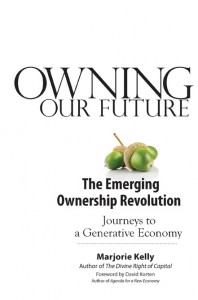EcoFaith leader Cecil Denney shared the following book review with us. Cecil is a member of Lake Oswego United Methodist Church. Please share with us your thoughts in the comment/reply section below.
More book reviews by EcoFaith leaders will be posted in 2015. If you are interested in sharing a non-fiction book review related to topics relevant to EcoFaith Recovery contact Office@ecofaithrecovery.org.
+++
 Owning Our Future: The Emerging Ownership Revolution; Journeys to a Generative Economy
Owning Our Future: The Emerging Ownership Revolution; Journeys to a Generative Economy
Marjorie Kelly (c) 2012 246 pages
Key Words: Extractive Economy, Generative Economy, Role of Ownership
Marjorie Kelly provides a clear exposition on the impact of ownership on our economic system. She contrasts what she refers to as an ‘extractive economy‘ with the ‘generative economy‘, the kind of economy that by design extracts economic and natural resource value from our world versus economic designs that generate a natural concern for localities well being and sustainability.
How companies are owned impacts how they behave. A large company whose financial basis is centered on stocks is designed to continually provide increasing value to its stock holders, to behave as if continual growth were possible forever. This design requires its leadership to seek greater and greater ways to extract value from the world increasing its claim on the natural and economic resources. By contrast, she points out that locally owned companies and banks tend to be investors in their local economies, concerned more with the health and sustainability of their communities. They are generative organizations, frequently in the form of cooperatives, and worker owned businesses, even private enterprises dependent on the local community.
In her book, she provides numerous examples of successful approaches and makes logical sense as to why they work. She also discusses how capital formation can be achieved in generative economies. Overall, this book provides one a sense of considerable hope that current experiments in generative economic companies and cooperatives can reverse the trends of the past 30+ years.
This book was helpful to me in visualizing how, within a capitalist economy, it is possible for its organization to become more democratic, sharing wealth among those who labor versus those who own capital.
________________________________________________________
To sign up to receive these blog post directly to your email account, click here or on the link in the upper right sidebar of any page at ecofaithrecovery.org.
Please feel free to share this post with others and use the “comment field” below to post your thoughts on this topic. Thanks!
